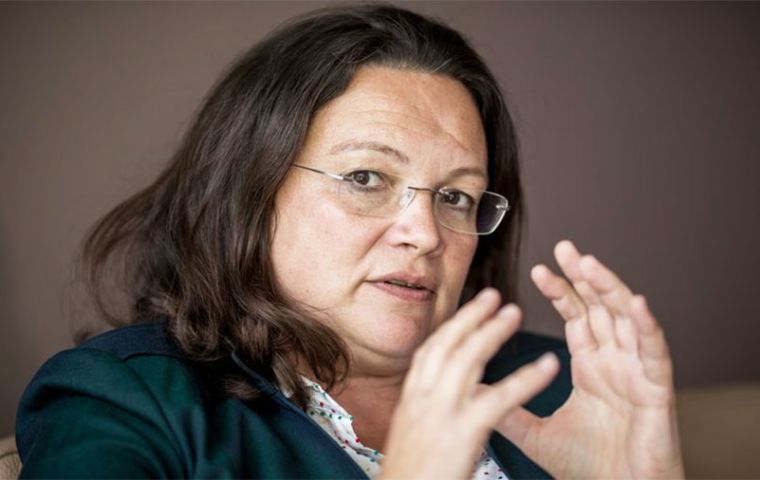MercoPress. South Atlantic News Agency
German regional election signals countdown for Merkel's coalition
 There are growing calls in the SPD to abandon the coalition. The party's leader Andrea Nahles is to present an “action plan” on Monday addressing concerns.
There are growing calls in the SPD to abandon the coalition. The party's leader Andrea Nahles is to present an “action plan” on Monday addressing concerns.  At a CDU party convention on December 6 Merkel could announce there that she will seek re-election as the CDU's leadership despite the electoral setbacks
At a CDU party convention on December 6 Merkel could announce there that she will seek re-election as the CDU's leadership despite the electoral setbacks The regional election in the German state of Hesse has delivered another political blow to Chancellor Angela Merkel with more voters fleeing to the left and right of the party. Merkel's Christian Democratic Union (CDU) party and her coalition partner in Berlin, the Social Democratic Party (SPD), saw heavy losses in the state of Hesse where a regional election was held on Sunday.
In the meantime, the left-wing Greens and right-wing, anti-immigrant Alternative for Germany (AfD) saw their share of the vote increase dramatically. Provisional results showed the CDU got 27% of the vote, down 11.3 percentage points since the last election in 2013 (and marking the worst result for the party since 1962). The SPD saw its support fall from 30.7% in 2013 to 19.8% in the vote.
Meanwhile, the Greens gains 19.7% of the vote (up from 11.1%) and the AfD was seen with 13.2% of the vote, tripling its vote share from 2013 and allowing it to enter parliament for the first time.
For Hesse, the result means the incumbent CDU-Greens coalition has lost its majority and could rely on the pro-business Free Democratic Party (FDP) to form a grand coalition. This so-called “Jamaica” alliance, named for the colors of the parties involved, was mooted after the German federal election last October but it failed to come to fruition.
Despite the CDU remaining the largest party, Klaus-Peter Willsch, the CDU's representative in Hesse, pointed out that the result was an indictment of the federal government and that no one is satisfied with the result.
For Berlin, the result is another blow to an already fractious and fragile alliance. A similar election result was recorded at the Bavarian state elections a few weeks ago and there is speculation that the SPD might jump ship as it sees voters punishing it for its association with the government.
“It's a very bad result and therefore need to figure out now how we regain credibility and the trust of the citizens. Above all in Berlin,” the Hessian SPD's General Secretary Nancy Faeser said. Meanwhile, Kal Klose, the chairman of the Greens party in Hesse, admitted that the regional election had shown that “the people don't like the style of how the grand coalition works.”
There are growing calls in the SPD to abandon the coalition, with vote losses being associated with the government rather than staying in opposition as it had promised supporters. The party's leader Andrea Nahles is to present an “action plan” on Monday addressing concerns.
There is bound to be some soul-searching for the CDU too at an upcoming party convention on December 6. Merkel could announce there that she will seek re-election as the CDU's leadership although this latest result from Hesse, following similarly disappointing result in Bavaria, makes that more unlikely. Despite her troubles, a challenger to her leadership has so far not emerged but that might not last long, one analyst noted.
With voters becoming increasingly disenchanted with the old political guard and many turning to the right-wing AfD for answers, Berlin needs to take note the big shift taking place in German politics, analysts said.
“The main risk to Merkel's shaky grand coalition in Berlin remains SPD infighting, but internal CDU dynamics will equally continue to create uncertainty,” Carsten Nickel, deputy director of research at Teneo Intelligence, said in a note late Sunday. He added that both parties were being “pulled in both directions” as they face threats from the left and right.
The rise of the overtly nationalist and anti-immigrant AfD party has been reflected throughout Germany and is a worrying trend for liberals in Germany. The party's increasing popularity has accompanied a rise in immigration to Germany and is seen as a rejection of Merkel's migrant policy.
“The underlying dynamic in German politics is twofold,” Nickel continued in his note. ”First, the AfD is now represented in all 16 regional state parliaments and the Bundestag. (Sunday's) result is therefore the final piece of evidence that the AfD has established itself within the German party system. Talk of a populist 'wave' does not nearly reflect the level of realignment that is currently underway in German politics.”




Top Comments
Disclaimer & comment rules-

Read all commentsThis female dog has more lives than a cat.
Oct 29th, 2018 - 04:26 pm 0More wooden stakes, please.
Commenting for this story is now closed.
If you have a Facebook account, become a fan and comment on our Facebook Page!